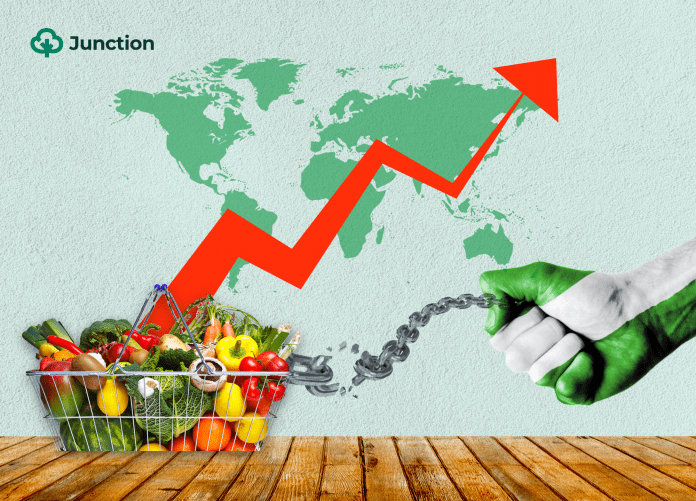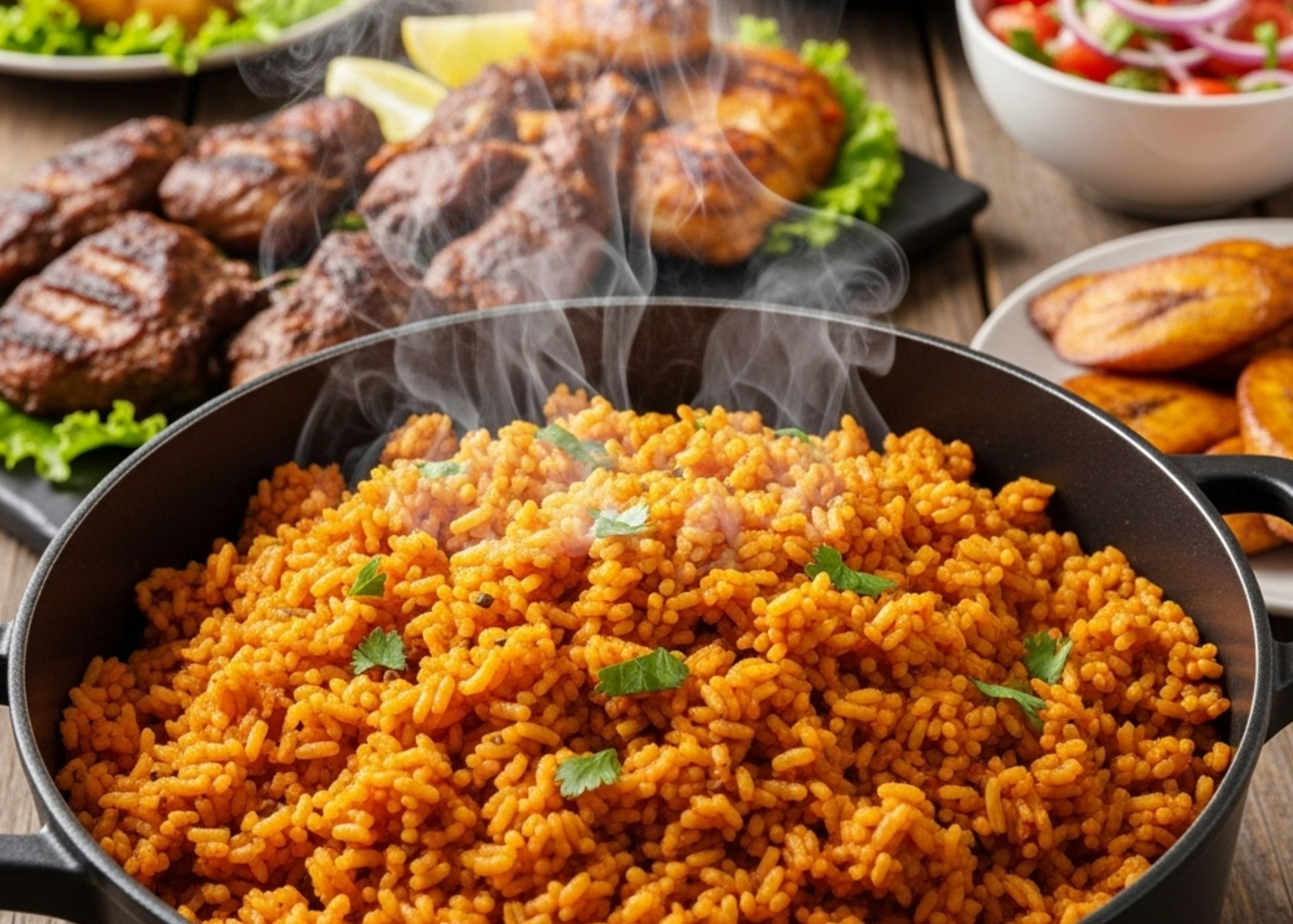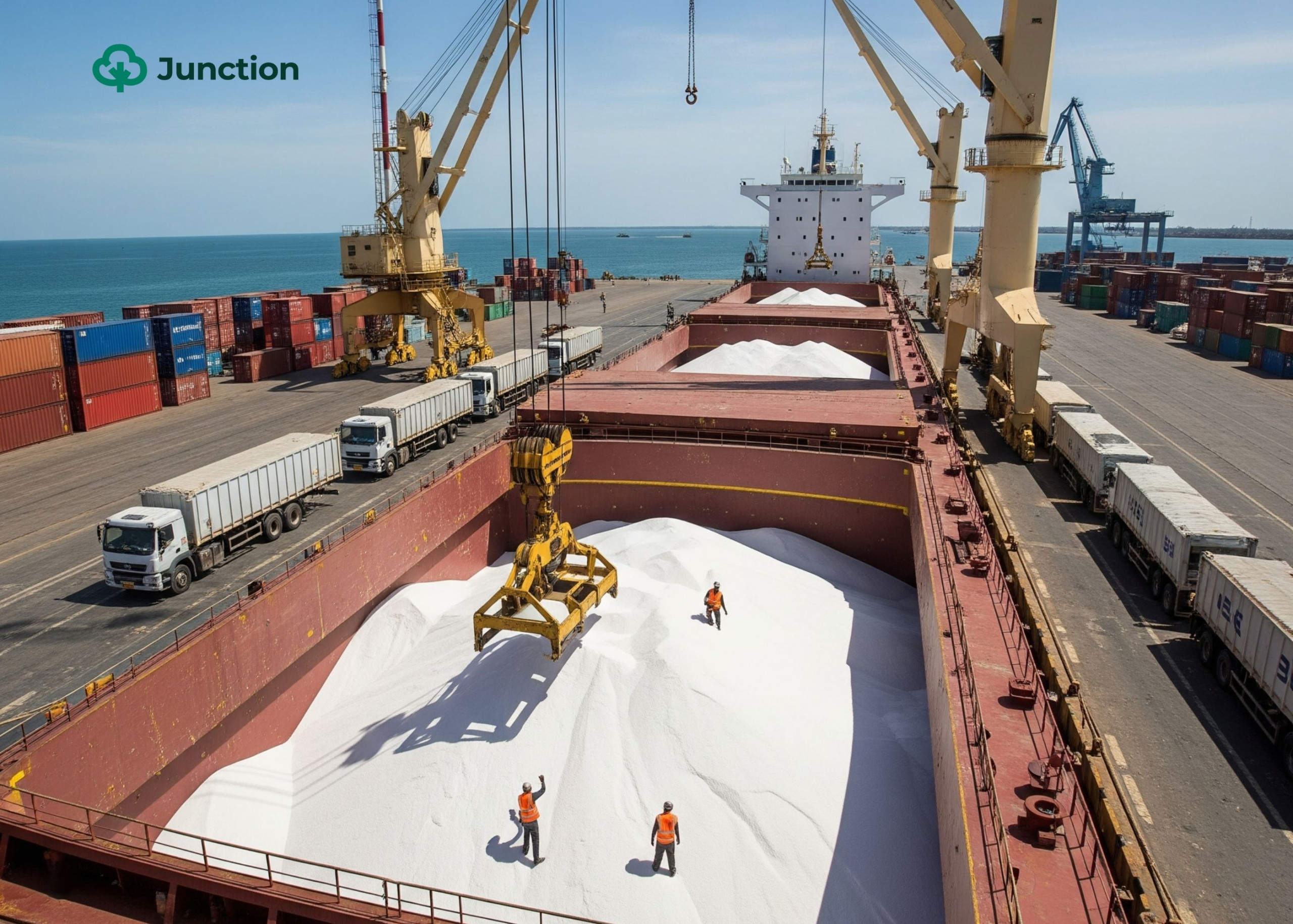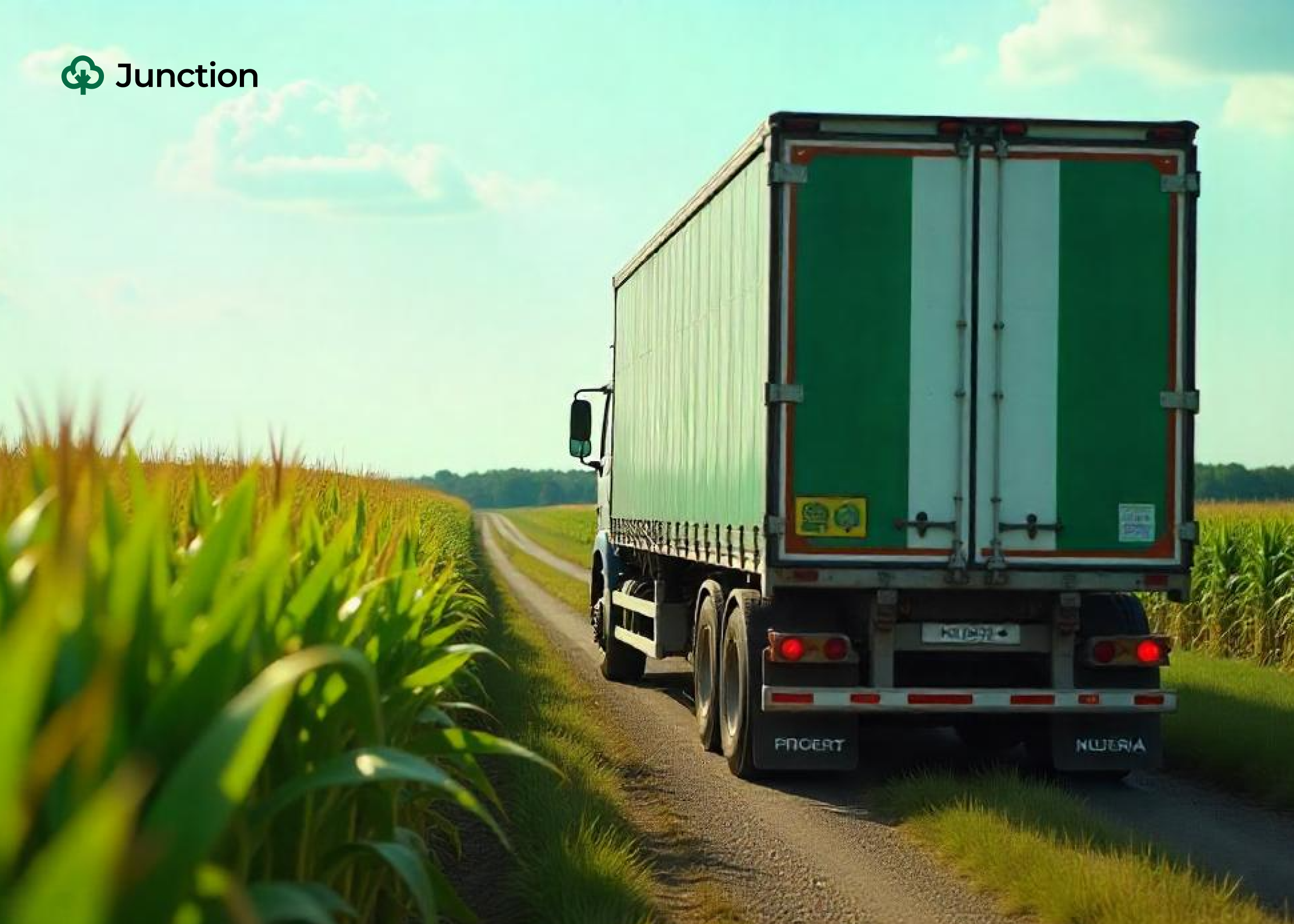Questions answered in this article: - What is the state of global food prices and how is it impacting Nigeria? - What domestic factors and issues are contributing to the rise of food prices in Nigeria?
As if living in Nigeria isnât already complex, consumers have seen their incomes shrink significantly in the past month due to reformist policies (including removing fuel subsidies and FX liberisation) by President Bola Tinubu. However, something else brewing worldwide is bound to have an even more dire impact on food security in Nigeria. In this article, we highlight the reason for increasing food prices in Nigeria to know where the solutions must be targeted to yield adequate results.Â
The first and most recent reason is the hike in global food prices. In July 2023, the global Food Price Index (FPPI)Â increased 1.3% from 123.9 to 122.4 points, signaling increased food pricesâparticularly vegetable oils. And guess what sparked this increase? Russia’s abrupt exit from the Black Sea deal on July 17. This deal, brokered in July 2022 by the United Nations (UN) and Turkey, was aimed at allowing Ukraine to export its grains through the Black Sea without disruptions from the Russian troops.Â
Since the deal was brokered, Ukraine has successfully exported 32.9 million tonnes of grains to the rest of the worldâmore than 50% have gone to developing countries through World Food program reliefs and trade. When the deal was signed, Russia wanted to pander to the demands of the developing countries, particularly those in Africa, to show the Kremlin was not attempting to worsen their food prices.Â
However, after backing off the deal, Russia has diversified ways to show its support for Africa. According to President Putin, Russia exported 11.5 million tonnes of grain to Africa and almost 10 million tonnes in the first half of 2023.Â
This explains why, despite Russia backing out of the deal, the FPPI increase was driven by the increase in prices of vegetable oilsâwith the third highest weight in the category. After seven months of steady decline in the price of vegetable oils, the July price index witnessed a 12% spike. Despite the muted growth in other segments (and even the significant drop in the sugar index), food prices still surged because the vegetable oils sub-index comprises 14% of the entire food index.

The vegetable oil price increases were driven by increased demand, the Black Sea deal, and a decline in production in countries like the US and Canada that typically produced these oil seeds.Â
Despite Ukraineâs role in the global supply of wheat and corn, both did not witness an increase in their prices following Russiaâs withdrawal from the Grains deal. Before the war, Ukraine supplied 10% to 15% of the global wheat and corn supply. This is primarily due to seasonal supplies to other countries diversifying away from sourcing their food from Ukraine.Â
While there’s a bit of optimism due to the decline in food prices in the past few months, global food prices are expected to continue rising in the coming months due to the supply blockage from one of the world’s major grain producersâUkraine.
You think global food prices are high? Come to Nigeria
The global food price hike doesnât bode well for Nigeria, as it means an even more aggravated food insecurity problem.
Nigeria has a severe food supply challenge, driven by an increase in global food prices and severe structural challenges the country has been facing in an attempt to increase food supply.
As of 2022 last year, food inflation was by about 21%. Between 2020 and 2022, the cost of essential foods has surged by an average of 23.9%. According to the World Food Programme (WFP), as of November 2022, 34% of the Nigerian population experienced a stressed food security situationâmainly in the North and some parts of the South East and West. As of January 2023, about 25 million Nigerians were at risk of hunger, which worsened in August due to the lean season. Now that petrol subsidies have been removed, this is bound to get even worse.Â

The increasing food insecurity can be attributed to various complex factors, including the country’s heavy reliance on imported food, shifts in how people consume and earn, and disruptions in local food supply chains, which weâll explore in detail.
A taste for foreign
Nigeriaâs food import dependence is one of the main reasons for its increased food prices. According to the International Monetary Fund (IMF), staple food prices in Sub-Saharan Africa (SSA) surged by an average of 23.9% in 2020-22, the most since the 2008 global financial crisis, primarily due to importation. SSA imports most of its top staple foods, including wheat, palm oil, and rice, making the pass-through from global to local food prices significant, nearly one-to-one in some countries.Â
Nigeria alone spends an average of $10 billion annually importing staple food items like wheat, rice, poultry, and fish, and imports to meet its food and agricultural production shortfalls. This import bill might rise due to the pressure on the global food supply chain from population growth, rising wealth, and urbanisation.
In the past few years, food supply has also been volatile because of climate change and high energy costs. On the one hand, climate change has disrupted agricultural production and affected crop yields, leading to low supply and higher prices. Meanwhile, high energy prices, notably the surge in natural gas prices, have increased the cost of production and transportation in the food industry, contributing to higher food prices. These factors directly impact Nigeria’s food import dependence and the prices of imported food items.
Locally, policies have threatened to increase the cost of importing food into Nigeria. Nigeria’s most recent foreign exchange reforms (to allow market forces to determine foreign exchange) have also affected the prices of food items. For example, adjusting the official exchange rate from â¦460 to â¦664 a few days after the announcement is bound to make imported food even more expensive.Â
However, it is worth noting that most of these staple foods were already prohibited from being imported using the official FX window rate. Therefore, the FX reforms will only marginal impact their prices because importers had to rely on the parallel market rates to buy them.Â
Shrinking consumer pockets
The decline in per capita consumption is another factor that threatens food security in Nigeria, and the situation is bound to worsen, given the petrol subsidy removal. While it has long-term benefits like giving the federal government some fiscal leeway to spend on other sectors of the economy,., the immediate and medium-term effects of higher fuel and food prices risk exacerbating food insecurity in the country.
It has already significantly impacted food prices by increasing transportation costs, directly impacting agricultural production and distribution.
According to SBM Intelligenceâs âJollof Index,â which tracks staple food prices across Nigeria, the cost of food items such as rice, beans, tomatoes, and onions has significantly increased since the subsidy removal. The index records that the average cost of ingredients required for making âJollof riceâ in Nigeria increased by 13.7% between March and July 2023, with the highest month-on-month increase (5.9%) happening between May and June (after the petrol subsidy was removed and fx reforms implemented).
Rising transportation costs due to high fuel prices have a ripple effect on the entire food supply chain. Farmers face challenges transporting their produce from rural areas to urban markets, reducing supply and hiking prices. The cost of inputs such as fertilisers and pesticides has also risen, further impacting agricultural productivity.
The removal of the petrol subsidy has hit consumers hard, particularly low-income households who spend a significant portion of their income on food. According to the most recent breakdown of consumption expenditure pattern, Nigerians spend about 56% of their income on food, while those in the rural areas spend about 61%. With increased food prices, many Nigerians struggle to afford necessities, leading to heightened food insecurity.
In response to the rising cost of living, the Nigerian government has declared a state of emergency on food security, recognising the severity of the situation. However, addressing the impact of the petrol subsidy removal on food prices requires a comprehensive approach. Investing in improving transportation infrastructure, supporting farmers with affordable inputs, and implementing policies to stabilise food prices and ensure access for vulnerable populations is crucial.
The impact of the petrol subsidy has been felt by both farmers and consumers, with transportation costs and input prices rising. As farmers attempt to reduce the impact on their revenues, they pass on these costs, further shrinking the pockets of the average Nigerian consumer.
A problematic supply chain
Finally, Nigeriaâs supply chain is fraught with disruptions (like herder-farmer clashes and poor transportation and storage) that significantly impact food prices.
Herder-farmer clashes have displaced farmers and destroyed farmlands, reducing agricultural productivity. These clashes, which have led to several hundreds of deaths, have discouraged farmers from going to their farms to plan, reducing the food supply in the country. Â
But itâs not enough for food to be planted; moving food from the farm to the market is not without its hurdles. Poor transportation infrastructure and storage facilities have led to significant post-harvest losses, reducing food supply and increasing prices. Nigeria is the 11th largest producer of tomatoes globally and the 3rd largest fruit importer in Africa. Apart from the high demand for tomatoes in Nigeria, much is lost post-harvest. The World Bank estimates that $2.4 billion of tomatoes were lost in 2017 post-harvest.Â
In conclusion, Nigeria faces a severe food security challenge due to various factors. The recent hike in global food prices, mainly vegetable oils, due to Russia’s exit from the Black Sea deal is bound to have an even more dire impact on food security in Nigeria.
Nigeria’s heavy reliance on imported food, shifts in how people consume and earn, and disruptions in local food supply chains also contribute to the increasing food insecurity. The removal of petrol subsidies has significantly impacted food prices, leading to increased transportation costs due to high fuel prices, directly impacting agricultural production and distribution. The decline in per capita consumption and the problematic supply chain, including herder-farmer clashes, poor transportation, and storage, are also significant factors that threaten food security in Nigeria.
Therefore, solving Nigeriaâs problems requires driving global food prices down and solving Nigeriaâs structural challenges to improve the quality and quantity of supply within the country. The Nigerian governmentâs declaration of a state of emergency on food security does well to recognise the severity of the situation. Still, more must be done to ensure an adequate food supply for the population.



